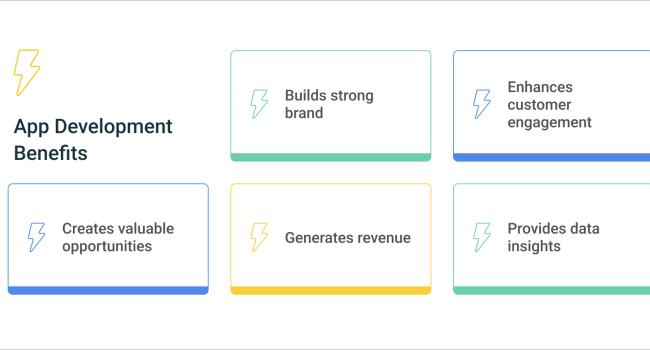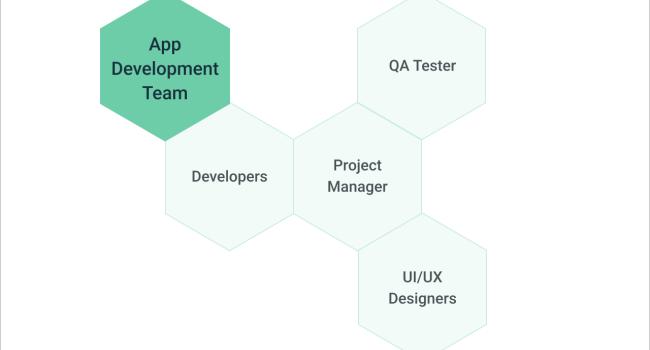Updated February 25, 2026
Mobile app development services are uniquely positioned to help clients transform their businesses with customized apps that meet their needs and promote optimal customer interactions.
Customers are increasingly willing and able to conduct business on mobile apps. However, the apps must be efficient and customer-friendly to keep customers engaged.
Mobile app development involves designing and producing software apps for mobile devices. Most mobile apps are developed for iPhones and/or Android phones. Effective app development requires a solid understanding of the end user, how they will engage with the app, and what they hope to achieve by using the app.
Brands that offer mobile apps must ensure they are high-quality and user-friendly. Well-designed mobile apps can improve a brand's visibility, recognition, sales, and productivity, while poorly designed mobile apps can decrease customer engagement. The stakes are high, so hiring an expert to deliver an app that meets your organization's needs is a good investment.
This guide discusses everything you need to know about mobile app development service providers and how to hire the best app development team for your organization.
Browse Related Focus Areas
What is Mobile App Development?
Mobile App Development: the process of producing software apps for mobile devices such as iPhones, Android phones, and tablets. This includes ideating, developing, designing, testing, and launching mobile apps.
Mobile app developers strive to design high-quality, user-friendly apps that are functional yet also eye-catching and enjoyable to use to maximize customer engagement. Mobile app development businesses can ensure that developers with the right skills, tools, and expertise design an organization's mobile apps.
Some of the tasks they will perform include:
- Conceptualizing and planning app functions
- Designing, developing, and launching high-quality native iOS apps and hybrid apps
- Updating apps for new versions of iPhones and Android phones
- Ensuring app security
- Enhancing app user experience (UX)
- Performing quality assurance (QA) testing
- Ongoing technical support and maintenance
Mobile apps serve an increasingly important function in many brands' marketing strategies, so they must be high-quality, secure, user-friendly, and offer a positive customer experience that engages customers and keeps them coming back.
Mobile App Development Services by Country
Mobile App Development Services by City
5 Benefits of Mobile App Development
Developing a mobile app can help brands deliver value to their customers by simplifying the purchase process, improving the customer experience, and encouraging customer engagement.

Here are some of the many ways in which brands benefit from developing mobile apps:
- Builds a strong brand: Mobile apps provide customers with the services they want when they want them, which builds brand loyalty. They are also an important source of customer data that helps brands better understand their customers.
- Enhances customer engagement: Mobile apps provide numerous ways for customers to engage with brands in addition to shopping. By adding features like shopping lists, customer reviews, push notifications, and social media to their apps, brands can encourage customer engagement in various ways.
- Creates valuable opportunities: Mobile apps help businesses give their customers better experiences with their brands, resulting in increased sales. Customers can quickly and easily move from social media ads to mobile apps to make purchases seamlessly on their phones. Mobile apps make products and services more accessible, increasing the likelihood of unplanned purchases.
- Generates revenue: Mobile apps simplify the purchasing process, leading to increased sales and revenue. Additionally, mobile apps allow brands to learn more about their customers. This information can be used to generate sales at lower costs than traditional advertising, resulting in increased revenues.
- Provides data insights: Mobile apps allow brands to collect customer data and use it to customize their shopping experiences. The data insights can be used to make personalized purchase suggestions based on a customer's past purchases, provide push notifications about relevant promotions, or wish the customer a happy birthday on the appropriate date.
What Services Do Mobile App Developers Provide?
Mobile app developers can provide various services depending on business needs. Here are some of the services that they typically offer, the responsibilities involved, and the goals of each:
- iPhone and iPad App Development
- Android App Development
- Cross-platform App Development
- Mobile App Publishing
- Consumer & Social App Development
- Enterprise App Development
iPhone and iPad App Development
iPhone and iPad app development service providers help businesses deploy and maintain high-performing and secure iOS applications. Mobile apps help businesses reach their target audiences, boost profitability, and increase productivity.
Native iOS apps run only on iOS devices. These apps enable businesses to compete in the vast iOS marketplace. Businesses focusing on iPhone and iPad app development help clients refine their existing apps and provide continuous support as algorithms and operating systems evolve. iPhone and iPad app developers use programming languages such as Swift and Python.
Android App Development
Android is the most dominant operating system in the global mobile market. Businesses build Android applications to attract customers and unlock business opportunities.
Android app developers specialize in designing and building sophisticated Android apps. They commonly offer additional services such as web development and custom software development.
Cross-Platform App Development
Cross-platform mobile app development providers develop, design, and test mobile applications for iOS and Android devices. They specialize in programming languages utilized on these platforms.
Native iOS apps enable businesses to take advantage of the large iOS marketplace. However, Android is still the most popular operating system in the global mobile market. Cross-platform app development allows organizations to remain competitive on both operating systems.
Mobile app development providers employ people with the correct skill sets, tools, and expertise to deliver the best apps for iOS and Android platforms.
Mobile App Publishing
Mobile app publishing is the process of making Android apps available to users. It includes preparing an app for release and publicizing, selling, and distributing it so users can download and install it on their mobile devices.
Android apps are often released through app marketplaces such as Google Play so they can reach broad audiences.
Mobile app publishing services may include project development, marketing support, global app testing, checking for privacy policy compliance, securing Google reviews, launching apps, and regularly updating them.
Consumer and Social App Development
Consumer and social apps have become ubiquitous. Well-known consumer apps include Google+, YouTube, Maps, and Translate. Popular social apps include Facebook, LinkedIn, X, Instagram, and Snapchat. Social media and consumer apps allow organizations to reach large audiences, collect data, build their brand, target audiences based on their interests, and attract followers.
Teams that develop these apps provide various services, including strategy development, UX/UI design, feature development and improvement, QA testing, and launching.
Enterprise App Development
Enterprise apps are computer programs designed for organizations. They are built for corporate or government use and often integrate with computer systems that run the organization's operations. Enterprise applications help organizations optimize their day-to-day operations and processes and enable cooperative workflows.
Typical enterprise applications include billing systems, customer relationship management (CRM), enterprise resource planning (ERP), and human resource (HR) systems.
Professionals who develop enterprise apps typically pride themselves on bringing an organization's vision to reality. This entails understanding the organization's needs well enough to predict how the apps will be used. Their services may include idea generation, discovery, and building and launching enterprise apps.
An expert mobile app developer may also offer the following services:
- Consultation: Developers should work closely with their clients to understand their goals and requirements.
- Design: Developers must focus on creating intuitive user interfaces to enhance the app’s experience.
- Development: The core service involves programming and building the mobile app from scratch.
- Testing: Developers should conduct rigorous QA testing to ensure the app functions smoothly across all platforms.
- Integration Services: Depending on the app's purpose, developers integrate third-party services like social media, analytics tools, and payment gateways.
- Security Services: Security measures should be in place to protect user data and prevent unauthorized access.
- Deployment: App developers should invest in launching their apps on app stores to make them accessible to their target audiences.
- Maintenance Support: After project launch, developers should continue monitoring the app’s performance, helping with updates, bug fixes, and feature enhancements.
How to Assess Mobile App Development Service Providers
Organizations and their app development providers must track the key performance indicators (KPIs) that measure how successfully their mobile apps meet predefined objectives.
The primary reasons that organizations should track KPIs are to determine if they need to change their strategies to achieve their goals and to develop success stories that can help them gain and retain clients. The KPIs typically used to measure mobile app success include:
- Active Users: The quantity of unique users who use an app during a specified period (e.g., daily, weekly, or monthly). This metric indicates how well the app engages users and measures growth, churn, and product stickiness.
- Session Time: The amount of time a user actively uses a mobile app, from when they launch it until they stop using it. The length and frequency of a user's interactions with an app are tracked to gauge and improve app usage trends.
- App Load Time: The amount of time it takes an app to load and become usable. The faster an app loads, the better the user experience. Faster load times can result in higher retention rates.
- Retention Rate: The percentage of unique users who continue to use a mobile app 1, 7, or 30 days after installing it. Retention rates help determine how mobile apps perform over time per user and why users disengage from apps.
- Revenue Generated: The money generated from in-app advertising. In-app advertising is beneficial to businesses because it helps monetize mobile apps. Tracking the revenue generated by mobile apps can help inform future ad monetization strategy decisions.
- Crash Reports: A detailed log of an app's condition when it crashed that helps developers identify the cause of the crash. Information typically conveyed includes device and OS breakdown, app version, occurrence count, unique users affected, and a timeline of interactions and events associated with the crash.
What is a Mobile App Development Team?
Mobile app development is a complex process requiring a multitude of skill sets. Teams typically comprise individuals with specific expertise and well-defined responsibilities.

Here are some of the most common roles on a mobile app development team:
- Project Manager: Manages and executes all work related to a mobile app development project, ensuring adherence to the agreed-upon timeline, budget, and scope.
- UX/UI Designer: Responsible for designing a mobile app's look, feel, and functionality to delight users and improve the user experience. They aim to create high-functioning apps that users find visually appealing, intuitive, efficient, and enjoyable.
- Frontend Developers: Build user interfaces for web and mobile apps using programming languages such as JavaScript, HTML5, Typescript, CSS, React, and Redux.
- Backend Developers: Ensure that the data and services requested by the front-end system or software are delivered.
- QA Tester: Performs automated and manual testing throughout the app development process to ensure the quality of the mobile app.
- Marketing Specialist: Uses marketing expertise to help clients market their mobile apps before publication. Often, this involves creating promotional content describing the app's features and uses.
- Customer Support Specialist: Provides technical support to clients. This may include resolving issues, troubleshooting technical problems, or diagnosing problems with hardware or software.
What to Look For When Hiring a Mobile App Development Team
Finding a mobile app development service provider that fits your organization's needs is essential to your app's success. Different app developers have different skill sets and experience levels. Your prospective development team should have a proven track record of delivering apps like the one you are hiring for.
In most cases, the top priority is ensuring that who you hire understands your requirements, goals, and how users will interact with the app. Other important factors are their ability to stay within your budget, their record for creating high-quality apps, how they plan to manage your project, and their experience in your industry.
A mobile app is an investment in your business. Evaluating your options and finding the mobile app development provider that best fits your organization is worth the time.
Criteria For Hiring a Mobile App Development Team
- Cost
- Relevant experience
- Programming language & platforms proficiency
- Fit with the organization's needs
- Ongoing support structure
- Comprehensive testing
- An acceptable timeline
- A creative approach to design
One of the best ways to learn about mobile app development options is by reading client reviews. Clutch's B2B marketplace provides ratings, reviews from real clients, and valuable information on thousands of app development service providers. Clutch makes it easy to evaluate your options and hire the mobile app development provider that best fits your organization.
Use Clutch's App Development Budget Template
Download Your App Development Template4 Considerations When Hiring a Mobile App Development Company
When hiring a mobile app development company, businesses should consider the following:
Portfolio & Experience
When looking into your options for app development support, review the portfolio to assess the quality of their previous work and see their past clients. This exploration will give you an idea of whether the team has experience developing similar apps to your vision or even worked with companies in your industry.
Depending on the app your company is looking to build, you should also look for developers with experience in different app development specialties:
- Android App Development: The process of creating applications that run on devices powered by Android operating systems and are hosted in the Google Play Store. Some languages used for Android app development are Java, C++, and Kotlin.
- iPhone App Development: The process of creating applications that are designed to run on Apple’s iOS operating system and can be distributed through Apple’s App Store. Some programming languages used for iPhone app development are Swift, Xcode, and Objective-C.
- Cross-Platform Development: The process of developing applications that can run across multiple operating systems. Cross-platform development offers advantages, including easier maintenance, faster development times, and the ability to reach a wider audience. Some popular cross-platform development frameworks include Flutter and React Native.
- Mobile App Publishing: The process of making a mobile app available for download and installation through official distribution channels. Mobile app publishing includes following app store guidelines, submitting the app for review, optimizing listings to improve visibility, and managing feedback.
Communication Style
Any partnership needs effective communication and collaboration. Ensure that the app development company you’re looking to work with has open lines of communication, meaning they provide regular updates and are responsive to any inquiries.
Inquire about different collaboration channels and determine the level of touchpoints to see if the company best suits your communication approach.
Location
Location should be a main consideration when hiring a mobile app development company. The location of an app development partner can have significant implications on various aspects of the project. If your team is considering working with a company outside your region, consider time zone differences, cultural compatibility, potential language barriers, and legal compliances that might differ.
Budget
Ensure alignment with the app development company regarding budget and payment. Discuss cost structure and payment terms early on to see if the company works best with your budget.
10 Questions to Ask When Hiring a Mobile App Development Team
- How will you learn about our organization, and how customers will use the app?
- Can you share some of your mobile app success stories?
- Can you provide a cost estimate?
- Can you describe your development methodology?
- What experience do you have developing apps for our industry?
- What metrics do you use to measure an app's success?
- What testing methods do you use, and how much testing do you do during development?
- How will the project be managed?
- Do you offer ongoing support and post-launch services?
- How will you creatively differentiate our app from others?
These questions will assist you with mobile app development hiring by providing the information you need to find the provider that best fits your organization. Take the time to carefully evaluate the responses you receive and how they align with your organization's values and needs.
How Mobile App Development Services Can Expand Your Organization's Growth Opportunities
Mobile apps help organizations stay competitive in today's dynamic marketplace. They increase customer engagement by reaching customers where they spend much of their time — on their mobile devices!
By providing enjoyable, interactive experiences, brands can create additional opportunities to engage with customers. This produces incremental purchase opportunities and generates additional sales. It increases customer loyalty and gives satisfied customers an easy-to-use platform for telling others about their positive experiences with your brand.
Customers are increasingly realizing the benefits of interacting with businesses through apps and are becoming more savvy about handling their interactions while on the go. The need for high-quality apps is increasing, and more and more companies are finding that having the perfect app in place is not only transformative but imperative. There are many mobile app development providers out there, but it is crucial to partner with a provider that truly understands your company’s unique needs and can design an app that will keep your customers coming back.
Hiring an exemplary mobile app development service provider is the best way to ensure you have a well-designed, high-quality, and user-friendly mobile app that your customers will want to engage with and recommend to others. This will help you strengthen your brand, gain data-driven insights about your customers, drive repeat purchases, expand your customer base, and generate revenue.
No matter what type of mobile app you dream of, Clutch can help you find a service provider that can turn your vision into reality on budget and on time!
















